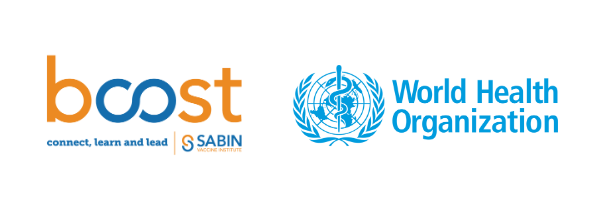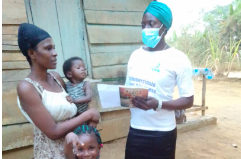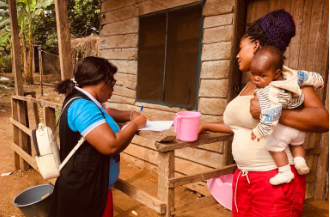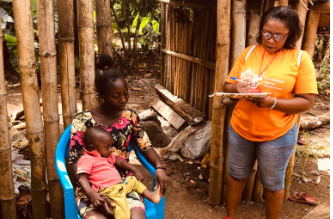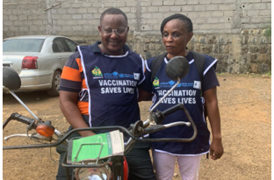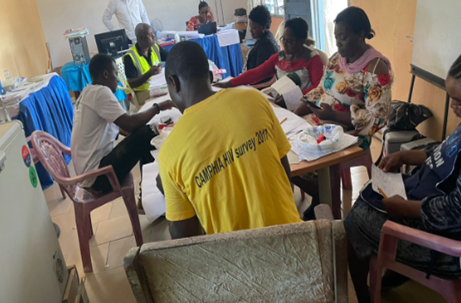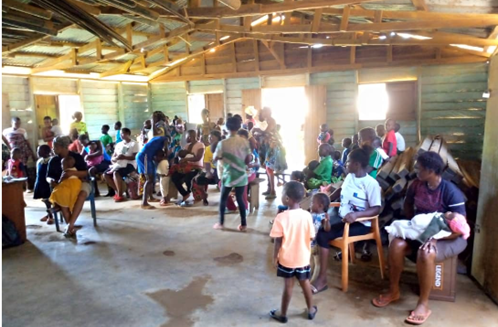Rebuilding Trust in Vaccination through Community Health Workers in Cameroon
In May 2022, Sabin’s Boost Community and the World Health Organization (WHO) launched the first cohort of the "COVID-19 Recovery for Routine Immunization Programs Fellowship". The aim of this program was to strengthen the capacity of national and sub-national immunization professionals to plan and implement immunization programming during the COVID-19 recovery period, with the ultimate goal of reversing the declining rates of immunization coverage. After an intensive live engagement series, Fellows were tasked with drafting their own strategic proposal for implementation or case study for publication. This series of Bright Spots that shares Fellows' key learnings and takeaways from the program.
Rebuilding Trust in Vaccination through Community Health Workers in Cameroon
In the aftermath of the COVID-19 pandemic, Martha Ngoe, trained as a medical laboratory scientist and serving as the Chief of Unit, Surveillance and Monitoring-Evaluation, Regional Coordination, Expanded Programme on Immunisaton (EPI) at the Ministry of Health of Cameroon, witnessed a growing number of unvaccinated and undervaccinated children in her country. The Southwest Region of Cameroon was facing a sociopolitical crisis characterized by the burning of health facilities and the displacement of segments of the population when the COVID-19 pandemic hit, worsening an already weakened health system. Many people became afraid of accessing health facilities since the onset of the pandemic, and they particularly feared the COVID-19 vaccine due to rumors circulating in the communities.
Martha, an active Boost member since 2019, was eager to join the 2022 COVID-19 Recovery for Routine Immunization Programs Fellowship and address decreasing immunization coverage in Cameroon. She said, “I saw this fellowship as an opportunity for me to interact with other immunization professionals around their own experiences.” The Fellowship, offered by the Sabin Vaccine Institute’s Boost Community and World Health Organization (WHO), provided an opportunity to strengthen the capacity of immunization professionals, like Martha, to recover and bolster immunization programs in their countries.
Addressing Vaccine Hesitancy Among Internally Displaced People
Martha’s project aimed to improve accessibility to vaccination services and enhance the training of health care workers in routine immunization to reduce the number of unvaccinated and undervaccinated children in Kumba North and Kumba South Health Districts of the South West Region of Cameroon. Amidst the crisis, Kumba became the residence of many internally displaced people in the region, and Martha recognized that many of these children were likely under- or unvaccinated. As this population is not static and has not participated in an official census, it is difficult to estimate the exact number of zero-dose children; however, some sources estimate the number of under- or unvaccinated children to be close to 100,000. They had their own unique set of worries pertaining to vaccination, especially the fear that they would not be accepted in the local health facilities because they were not known in the community, along with widespread distrust in the government by the entire population.
Within these two health districts, Martha and her team identified six health areas with low vaccine coverage. They trained community health workers (CHWs) and healthcare workers (HCWs) on community mobilization and reducing the missed opportunities for vaccination in the communities. Martha credits funding from the Fellowship as an essential contributor to the project’s success because it helped Martha and her team obtain more resources, access transportation and get to hard-to-reach homes, and facilitate training sessions.
Implementing New Ideas: The Power of Community Health Workers
In Cameroon, CHWs are not usually deployed to track routine immunization on a regular basis, and instead are only utilized during immunization campaigns. However, for Martha’s project, CHWs tracked and reviewed immunization data in order to keep track of vaccinations and compare immunization rates to prior years. Martha intuited that community members would be more comfortable with CHWs than HCWs who are usually from different regions. She said, “the community needs somebody that they will trust and this person that they will trust might likely come from the community.” The training of CHWs ended up being one of the most valuable components of the proposal because they helped increase demand for vaccination in the midst of a conflict setting and filled the gaps that HCWs could not reach.
“The community needs somebody that they will trust and this person that they will trust might likely come from the community.”
Before implementation of Martha’s project, in Kumba North District, 151 children were vaccinated with the Penta-1 vaccine; 212 children with the Penta-3 vaccine; and 549 girls with the Human papillomavirus (HPV) vaccine. In Kumba South District, 134 children were vaccinated with the Penta-1 vaccine; 109 children with the Penta-3 vaccine; and 397 girls with the HPV vaccine. No adolescent boys received HPV vaccination in either district.
Upon completion of Martha’s project in February 2023, 1,219 zero-dose children were vaccinated with the Penta-1 vaccine and 1,106 under-vaccinated children received the Penta-3 vaccine in Kumba North District. Additionally, 1,177 adolescents, both male and female, were vaccinated with the HPV vaccine in the district. In Kumba South District, 1,953 zero-dose children received the Penta-1 vaccine and 1,787 children were caught up with the Penta-3 vaccine. Moreover, 957 boys and girls received the HPV vaccine.
| Vaccine Coverage Before & After Project Implementation | ||||||
|---|---|---|---|---|---|---|
| - | Before | - | - | After | - | |
| - | Penta-1 | Penta-3 | HPV (Girls) | Penta-1 | Penta-3 | HPV (Boys + Girls) |
| Kumba North District | 151 | 212 | 549 | 1,219 | 1,106 | 1,177 |
| Kumba South District | 134 | 109 | 397 | 1,953 | 1,787 | 957 |
| Total | 285 | 321 | 946 | 3,172 | 2,893 | 2,134 |
Martha noted that the mentorship offered by the Fellowship was indispensable to the success of her project. Speaking of her mentor, she said, “[My mentor] was always there. She was pushing through trying to reshape the ideas I had, and she was there to the last minute and even opened my eyes to things that I could not see for the project, which was very helpful to me.”
Martha encourages her peers to think outside of the box when implementing similar projects. She said, “They should critically look at what is the reality on ground, what is applicable in each context.” Meanwhile, global and national actors should not forget to look to local actors for input into projects. Martha added, “[Global and national actors] really have to contact those who are down at the grassroots to have the true information and not just make conclusions at the national level.”

2022 Fellow & Contributor
Martha Ngoe is a graduate researcher who has been working in the field of immunization for over a decade. She is passionate about vaccine research and development and reaching every child with vaccination services.
